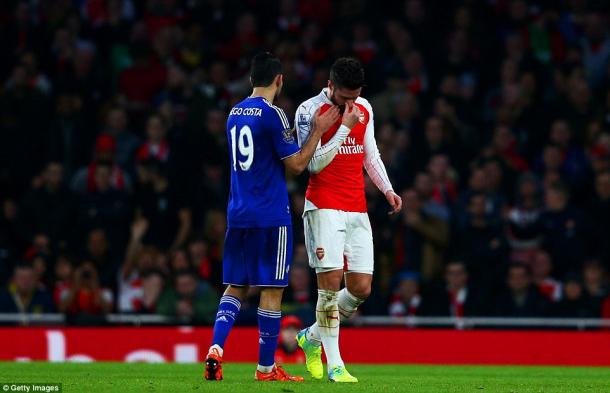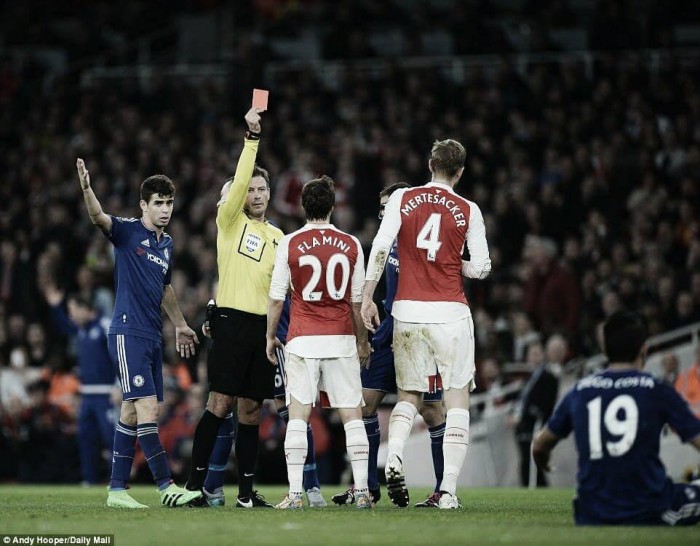Arsenal’s title hopes were dealt a blow after they suffered a 1-0 defeat to Chelsea at the Emirates on Sunday. The result leaves the Gunners in third place in the Premier League table, three points behind league leaders Leicester City and level on points with Manchester City.
The Gunners were reduced to 10 men after just 18 minutes with Per Mertesacker being dismissed for a challenge on Diego Costa. The contact, if any, was minimal, but this ultimately proved decisive in the overall outcome, and caused a number of tactical headaches for Arsène Wenger.
Wenger’s decision to withdraw Giroud
Mertesacker’s red card ensured the North Londoners were in for an uphill struggle, and to the apparent bemusement of the Emirates faithful, Olivier Giroud was the sacrificial lamb for Gabriel Paulista, who came on to partner Laurent Koscielny in defence. This substitution was met with jeers by the Arsenal crowd, but fitness concerns surrounding Giroud prior to the game may have been the major factor in Wenger’s decision.
However, from a tactical perspective, Giroud’s withdrawal was logical. Whilst the Frenchman provides a focal point, he would have become isolated up against Chelsea’s back-four. John Terry and Branislav Ivanovic have been exposed by pace on numerous occasions this season, therefore Theo Walcott and Joel Campbell both remained on the pitch. It seemed inevitable that Chelsea would dominate possession and Arsenal’s main threat would come via the counter-attack, therefore pace seemed the obvious strategy.
Wenger explained his reasoning in his post-match press conference, admitting: "I knew we had to go long distances. Our chance was to have good pace on the counter. That is why I made the decision.” Yet, Arsenal’s task was made immeasurably tougher just minutes after this substitution, as Costa gave Chelsea the lead. Suddenly, the emphasis was on Arsenal to force their way back into the contest, but they lacked offensive cohesion.
Mesut Özil was Arsenal’s most advanced player throughout the 90 minutes, yet the German should ideally have been deployed in a deeper role, feeding the likes of Walcott and Campbell. Walcott remained stuck on the left-wing and crucially, Arsenal had no creative outlet due to Ozil playing so high up the field. Alexis Sanchez’s introduction gave the hosts some energy and impetus, but they still struggled to fashion clear-cut chances.

Arsenal began to establish control in the closing stages, but Chelsea opted to drop deeper and deeper, which nullified the pace of Sanchez, Walcott and Alex Oxlade-Chamberlain. If Giroud had remained on the pitch, the North Londoners would have been able to deliver more crosses into the box, which would have tested Chelsea’s back-four. Yet, hindsight is a wonderful gift, and Wenger was in an unenviable position.
Lack of midfield discipline
It’s extremely difficult to criticise the Gunners for their efforts, considering they were down to ten-men for 75 minutes on Sunday, but their tentative start to the contest can be criticised. Mathieu Flamini and Aaron Ramsey have deputised well in central midfield in the prolonged absence of Francis Coquelin and Santi Cazorla, but their partnership has several limitations, which were exposed on Sunday.
Ramsey works extremely hard both offensively and defensively. He provides greater offensive threat than Cazorla, yet defensively, Ramsey’s positional discipline is inferior compared to the diminutive Spaniard, and the likes of Oscar, Willian and former Gunner Cesc Fabregas were given license to roam in the opening stages of Sunday’s clash.
Many people question why Ramsey is often deployed out on the flank, rather than in his preferred central role, but the opening 20 minutes perhaps illustrated why. Wenger values the Welshman's creativity and work-rate, but his positional discipline is still a concern and, as a consequence, this left Flamini completely exposed.
For a team with aspirations of winning the Premier League title, Flamini should not be featuring, but Arsenal’s lack of depth in the defensive-midfield role has made the Frenchman’s inclusion a necessity. To his credit, he has deputised reasonably well, but he endured a troublesome afternoon against the champions.
He gave Willian acres of space to play the defence-splitting pass that resulted in Mertesacker’s sending off, and he failed to win a tackle in the entire 90 minutes. Arsenal’s two best chances arguably fell his way and whilst he was unable to convert these opportunities, the most pressing issue is why was he vacating his position in the first place?
Chelsea’s Pragmatic Approach
It’s hard to compare the respective tactical approaches of Wenger and Guus Hiddink, as the match wasn’t an even contest from the 18th minute onwards. However, it was noticeable that the Dutchman paid Arsenal the utmost respect by including two defensive-midfielders, in the shape of John Obi Mikel and Nemanja Matic.
Mikel and Matic both suffocated Ozil in the opening stages, as Chelsea realised that preventing the German from enjoying time on the ball was key to the overall outcome. Mikel and Matic’s partnership enabled Fabregas to play further forward too, and he performed impressively in the opening half as Chelsea largely dictated possession.
Mertesacker or Gabriel?
Nevertheless, the biggest concern for Wenger was the pressure placed on Mertesacker by Costa. The Chelsea forward was closing down the German at will and playing on his shoulder, which resulted in his sending-off.
Wenger clearly values Mertesacker’s leadership qualities, but his lack of pace is becoming exploited with increasing regularity. This is largely down to the Gunners’ attacking philosophy, where full-backs Hector Bellerin and Nacho Monreal are integral to their attack. Yet, when the Gunners are dispossessed, this leaves Koscielny, and particularly Mertesacker, exposed and vulnerable.
Gabriel offers a different alternative. In many ways, he is similar to Koscielny; he is tenacious, pacey and strong in the tackle. The two complement each-other well, but Wenger has reportedly been reluctant to thrust Gabriel in to the starting XI due to his poor grasp of English.
Despite this, the manager may be forced to re-evaluate his central-defensive pairing following Sunday’s defeat. Mertesacker may be Arsenal’s defensive leader, but Gabriel has impressed whenever he has been afforded a starting opportunity.
The Brazilian allows the Gunners to maintain their attacking philosophy, and his mobility leaves them less susceptible to the counter-attack. He also enables Wenger’s side to adopt a higher defensive line, which they employed to great effect in the second half against Chelsea.
We’re approaching a critical period in Arsenal’s season, and the decision regarding Koscielny's defensive partner may prove to be season-defining.






































